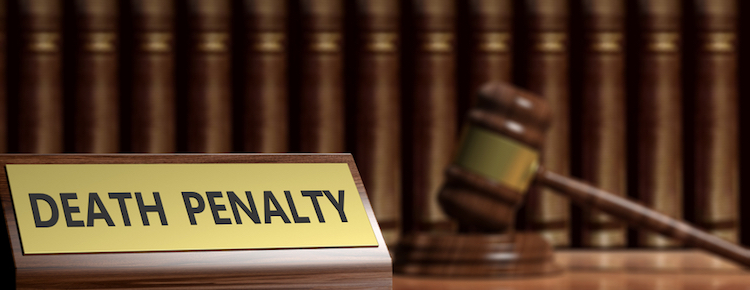Supreme Court rules for inmate who wants hands-on, out-loud prayer at his execution

Image from Shutterstock.
The U.S. Supreme Court ruled 8-1 Thursday for a Texas death row inmate who wanted his longtime Baptist pastor to lay hands on him and pray out loud during his execution.
The Supreme Court ruled that inmate John Henry Ramirez is likely to prevail on his claims under the Religious Land Use and Institutionalized Persons Act.
If Texas reschedules Ramirez’s execution without granting his religious request, a district court should step in and “grant such relief,” the court said in an opinion by Chief Justice John Roberts.
The Religious Land Use and Institutionalized Persons Act, the law at issue, bars the government from imposing a substantial burden on religious exercise by prisoners and others residing in institutions. Once a person seeking relief under the law shows a substantial burden, the government can’t prevail unless it shows that the burden is the least restrictive means of furthering a compelling governmental interest.
Prison officials had argued that absolute silence is needed during the execution, so they can monitor the inmate’s condition through a microphone. But they failed to show that a categorical ban on all audible prayer is the least restrictive means of furthering that interest, Roberts said.
Prison officials could limit the volume of the prayer, could require silence at critical moments and could oust spiritual advisers who fail to comply with the rules, Roberts said. The advisers could also be required to sign “penalty-backed pledges” that they will comply.
Prison officials had also argued that allowing touch could put the pastor in harm’s way if the inmate escaped restraints, or the pastor could interfere with the execution process, perhaps by yanking out the IV line. But a complete ban is not the least restrictive means of addressing those fears, Roberts said.
Security escorts accompany the spiritual adviser, and any touch could be limited to parts of the prisoner’s body far from the IV line, Roberts said. Also, spiritual advisers could be trained in precautions that must be taken in the execution chamber.
Roberts cited a “rich history of clerical prayer” at executions, including audible prayer. More recently, in 2020 and 2021, the federal Bureau of Prisons allowed religious advisers to speak or pray audibly for at least six executions.
Roberts noted that the Supreme Court’s holding “arises in the context of a preliminary injunction.” Further proceedings on remand, if necessary, “might shed additional light on Texas’ interests and on whether its policies are narrowly tailored,” Roberts aid. “But such proceedings might also contribute to further delay in carrying out the sentence. The state will have to determine where its interest lies in going forward.”
Ramirez had been convicted for fatally stabbing a convenience store clerk in 2004 during a string of robberies.
Ramirez was at first denied access to the Baptist pastor after Texas barred all chaplains from the execution chamber. Texas later changed its rule to allow religious advisers into the execution chamber, subject to a background check and other safety measures. But Texas said Ramirez could not be touched by the pastor, and the prayer could not be audible.
Justice Clarence Thomas dissented. Thomas said he thinks that Ramirez’s claims are procedurally barred, and they don’t warrant equitable relief.
“Petitioner John Henry Ramirez stabbed Pablo Castro 29 times during a robbery that netted $1.25,” Thomas wrote. “Castro bled to death in a parking lot. Since that day, Ramirez has manufactured more than a decade of delay to evade the capital sentence lawfully imposed by the state of Texas. This court now affords yet another chance for him to delay his execution.”
Thomas was absent from oral arguments through Wednesday of this week following his Friday hospitalization for an infection. The Supreme Court has not provided any updates on his condition, CNN and SCOTUSblog reported Wednesday.
Justice Stephen Breyer told TMZ on Wednesday he thinks that Thomas is “fine.”
The case is Ramirez v. Collier.
Write a letter to the editor, share a story tip or update, or report an error.


